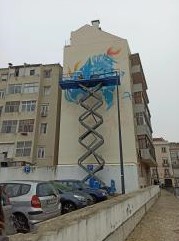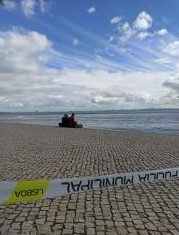[urban interfaces] Blogs
Lisbon and the Pandemic: Urban (In)Formal Structures and Practices
This blogpost is a result of the graduate seminar “Interfacing the (In)formal City” 2021.
Written by Lisa Spinelli.
Lisbon and the Pandemic: Urban (In)Formal Structures and Practices
In contemporary urban settings, multiple structures are shaping the way people live their lives, from transportations, to economic transactions, and, up to a certain point, to the way they interact with each other. Besides the well-known financial, architectural and political structures that determine the shape of our cities, new economic forces started to have a growing influence over a kind of relational culture that that they have all the interest in defining as grass-root and as pertaining to popular agency (Dijck et al. 2018). Companies as the Big Five are silently expanding their markets at an accelerated speed by providing people with services – as ride-hailing, packages and food delivery, and social networks – that are changing their daily routines and interaction patterns. Any reflection made on this themes today can’t avoid considering the impact of the great force that (temporarily) transformed our everyday life in such a radical way since the beginning of 2020: the Covid-19 pandemic.
Lisbon is a peculiar city, where, among the local population, there is a diffuse sense of owning public spaces. The streets are alive, inhabited by locals and foreigners that meet up, unrestricted by the necessity of consuming drinks and food in bars and tascas. Public spaces as squares, parks and panoramic points host spontaneous music and dance performances. More often than not, the police force operates in a dialogical way and doesn’t enforce the law brutally. A common practice here, allowed by the city municipality, is the painting of giant graffiti. These pieces of art, elsewhere often linked to illegal practices, decorate many spots of the city and are reason of pride among its inhabitants.

Lisbon (in)formal
graffiti culture
Maybe the reason why these escapes are possible, is to be found in the structure of the city. While in 19th century France Paris was rebuilt along the lines of openness and orthogonality, making it impossible to be reconquered by bottom-up forces (Scott 2006), Portuguese state adopted an opposite political move. During the regime of Salazar, ended in 1973, state policies privileged “a peasant life-style” and the corresponding urban structure, the aldeia (village), over a neoliberal economic system and the corresponding big urban settlements. As a result, Lisbon, the capital city, is still composed by various aldeia-like neighborhoods, and is characterized by a very extensive tangle of alleyways where getting lost is very easy. The structure of Lisbon surely facilitates informal interactions and practices among people. The state still relies on local social networks to provide help to aged or disabled people during their daily life in neighborhoods full of steep stairs and stone lanes. While top-down laws still have a semi-total power over decision making regarding the structure of the city, practices as authorized graffiti-painting or the soft law-enforcement talk about a positive amount of flexibility between the formal and informal structures and practices in this urban area.
This form of flexible interaction was put to a very difficult test during the Covid-19 pandemic. Used to much softer relation to political authority – but surely not unlike in many other countries – great numbers of Portuguese found it very hard to abide to the regulations coming from the state, even if the health of the entire population was at stake. Many bars stayed open longer than the curfew, and forbidden cultural events and gathering were calling the attention of the authorities from every corner of this intricate city. Many were astonished to see the police take an active role in enforcing increasingly severe state measures, and many episodes of confrontation were provoked by citizens trying to test the consistency of the borders of the state authority. Creative interpretations of state measures and practices attempting to reappropriate spaces and moments – trying to return them to a form of personal and popular agency (Cuff et al. 2020) – didn’t cease. A typical scene from the last lockdown would be seeing consistent numbers of people crossing Lisbon’s Police plastic tapes to sit down in parks or by the shore just as long as a policeman didn’t pass by, as a materialization of Covid-style (in)formality.

Temporarily Public
Spaces
Another typical scene, with which I’ll conclude my reflection, would be to go walking on the streets to breath in some fresh air, and find none around except a heavy traffic of couriers delivering packages, and Uber-eats or Bolt-Food transporters spinning on their bikes. On the buses, a series of faces buried under masks, fogged glasses, and gaze stick to their phone, with an even greater obstinacy than in pre-pandemic times, to avoid any kind of human contact. The materialization of Covid-style (in)formality presents itself in an extremely poignant way through the multiplicity of apparently informal intimate actions people started doing with a greater frequency during the lockdowns. The smart-phone’s applications actually determine quite strictly the kind of practices people end up doing and the culture they are living in, while assuming the shape of simple facilitators of pre-existing relations and needs, to the advantage of the before-mentioned Big Five.
Old historical legacies left in the form of the city; formal political regulations; an almost invisible layer of economic transactions assuming the shape of intimate, active, popular choices. These elements have a great shaping power over human practices and interactions in Lisbon, even in this city where informality has such an important role. In this sense, Covid-19 revealed many silent (in)formal dynamics happening in this urban area.
Bibliography
Cuff, D. et al. 2020. Urban Humanities: New Practices for Reimagining the City, Urban and industrial environments. Cambridge, MA: The MIT Press.
Dijck, J. et al. 2018. The Platform Society: Public Values in a Connective World. New York: Oxford University Press.
Scott, J. 2006. “Cities, People, and Language.” In The Anthropology of the State. A. Gupta and A. Sharma (Eds.), 247-269. Blackwell.

